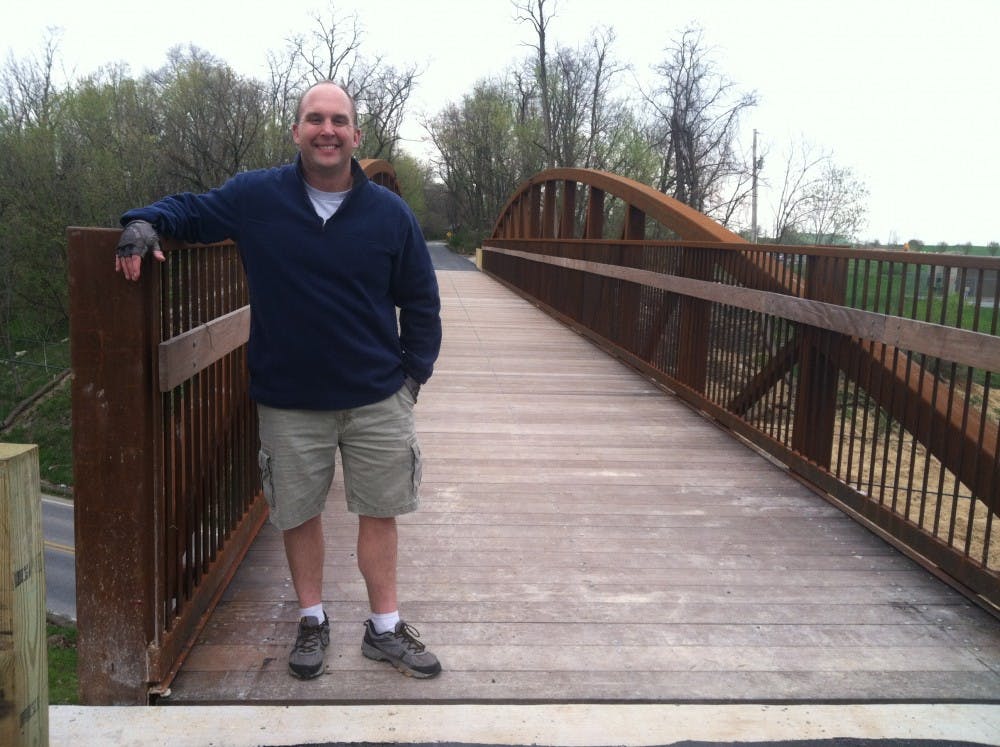The first thing one notices in Allen Dieterich-Ward’s tiny office is his unusual collection of old coal mining artifacts. His largest is a deep black image of a mining shovel called “The Gem of Egypt.”
“The story I always tell is when I was a kid my grandparents always told the story of the community they grew up in, called Egypt Valley,” Dieterich-Ward said. “It was stripped mined out of existence.”
Egypt Valley was a country crossroads with a general store and a post office that served about 100 people on nearby farms.
After coal was discovered, the farmers were forced into exodus and the entire region was stripped bare.
“I grew up interested in those kinds of stories and then I followed that interest into college,” Dieterich-Ward said.
Currently an associate professor specializing in environmental history, Dieterich-Ward is also the president of the Pennsylvania Historical Association, editor of the Pennsylvania History Series, board member on the Cumberland Valley Rails-to-Trails Council and member of the Rotary Club.
As he stood to remove a thick, green-bound book from his shelves, he said, “If you would like to see a prop…
“This is the college thesis I wrote in college on this community called Egypt Valley. I did a bunch of oral histories and interviews. And then that led me to pursue history as a degree and I followed that through into graduate school.”
Dieterich-Ward, 38, was born in Wheeling, West Virginia, and grew up in Barnesville, Ohio.
He earned his undergraduate degree in history at the College of Wooster in Wooster, Ohio, in 2000 and his doctorate in history from the University of Michigan in 2006.
“I’ve always loved teaching. My life was really transformed by the college I went to,” he said. “I was always naturally inclined toward, sometimes annoyingly so, to helping other people and to learn.”
Dieterich-Ward has been teaching at Shippensburg University since 2006.
“They offered me a job,” he said simply. “The reason I came to Shippensburg was because initially I was finishing my dissertation, which is a difficult time because you’re applying for jobs based on a dissertation you don’t have done yet.”
After being rejected for his first job application, he was invited to teach as a temporary faculty member a few months later.
“I didn’t have any better prospects at the time so I said yes and I came,” Dieterich-Ward said. “I worked really hard. I got good feedback from my students and from my colleagues. So the next year they had another position open up. The second time I applied for this permanent position, I got it.”
Dieterich-Ward is extremely active on campus. He helped rebuild SU’s undergraduate research committee since he joined in 2007. He also helped develop the student research conference held in the spring.
He also started the Summer Undergraduate Research Experience grant (SURE).
Published in 2016, Dieterich-Ward authored the book “Beyond Rust: Metropolitan Pittsburgh and the Fate of Industrial America.”
In addition to being a full-time professor and active in the historical community, Dieterich-Ward is involved in nature activities.
He is also the overseer of the Tuscarora Trail for the Potomac-Appalachian Trail Club. He spent the weekend of April 8 being certified to use a chainsaw.
When he is not on campus or futhering his research, Dieterich-Ward is homebrewing his own beer and hard apple cider, trail hiking, bike riding or sailing on one of his two boats.
Dieterich-Ward married his wife, Amanda, in 2004.


The Slate welcomes thoughtful discussion on all of our stories, but please keep comments civil and on-topic. Read our full guidelines here.